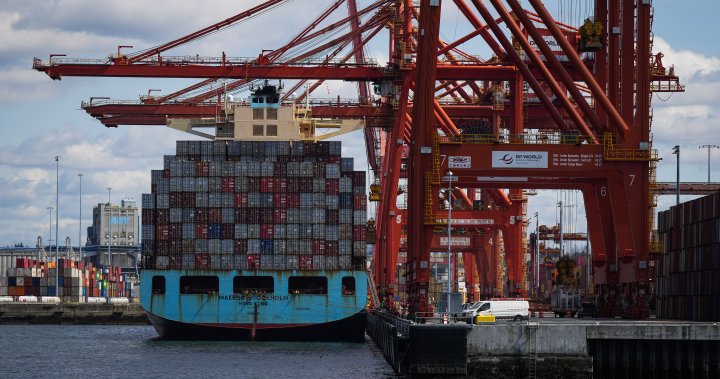A potential strike among cargo loaders in British Columbia is predicted to cause significant damage to the economy. If the strike occurs, it could result in a buildup of containers in vital west coast ports and lead to higher prices for consumers across Canada. The International Longshore and Warehouse Union Canada (ILWU) has issued a 72-hour strike notice to the British Columbia Maritime Employers Association (BCMEA), with roughly 7,400 terminal cargo loaders expected to walk off the job on July 1. The union is demanding better compensation to counter the impacts of inflation and ensure job security amid contracting out and automation at ports.
The strike would disrupt more than 30 B.C. ports and 49 employers, including the crucial ports in Vancouver and Prince Rupert, which are essential for Canadian trade. Approximately $800 million worth of goods pass through these ports daily, making up a significant portion of Canada’s total imports and exports. Werner Antweiler, a professor at UBC Sauder School of Business, describes these ports as critical infrastructure and a bottleneck for the economy. If they were to go offline for even a few days, the costs could amount to hundreds of millions of dollars.
Antweiler emphasizes that the longer the strike lasts, the more profound the effects will be. Industries reliant on imported goods, such as manufacturing (including the auto sector) and retail, will be most affected. Trucking and warehousing industries may also face delays and layoffs. The strike could cause further supply chain disruptions, leading to additional delays and higher prices for consumers who are already dealing with inflation caused by the COVID-19 pandemic.
Given the extensive impact a strike would have, there will be enormous pressure on both parties involved to reach a deal and avoid prolonged disruption. The Canadian Chamber of Commerce has expressed deep concern about the strike notice and calls upon the federal government to utilize all available means to prevent a strike. Federal ministers and B.C. Premier David Eby have urged workers and employers to find a resolution and emphasized their support for collective bargaining.
Considering the volume of trade passing through B.C. ports, every day without the flow of goods significantly affects supply chains. Antweiler notes that approximately 3.5 million containers pass through these ports annually. Hence, any halt in operations would result in a backlog that takes days or even weeks to relieve and return to normal. Similar economic concerns were raised during previous blockades in Coutts, Alta., and at the Ambassador Bridge between Windsor, Ont., and Detroit, Mich., where the federal government invoked the Emergencies Act to clear the blockades.
Although the initial impact of border closures on businesses was felt, overall cross-border trade volumes in Ontario and Alberta grew in February 2022 when the blockades were active. Businesses had to adapt and reroute shipments to deal with the closures. However, the potential strike in B.C. poses a significant threat to the economy, and it is likely that federal and provincial governments would intervene after two weeks with possible legislation to prevent further damage.
Denial of responsibility! VigourTimes is an automatic aggregator of Global media. In each content, the hyperlink to the primary source is specified. All trademarks belong to their rightful owners, and all materials to their authors. For any complaint, please reach us at – [email protected]. We will take necessary action within 24 hours.


